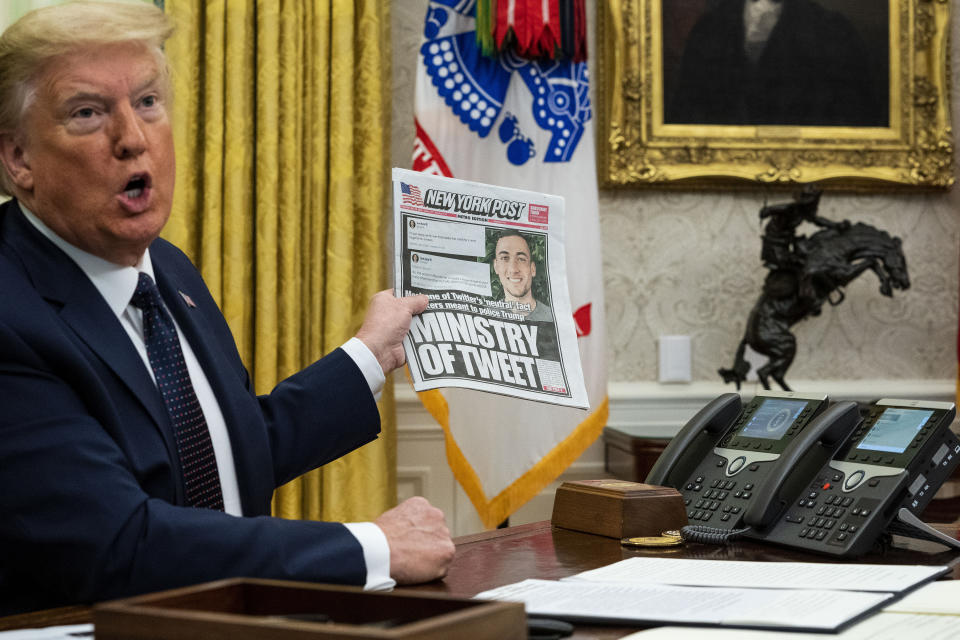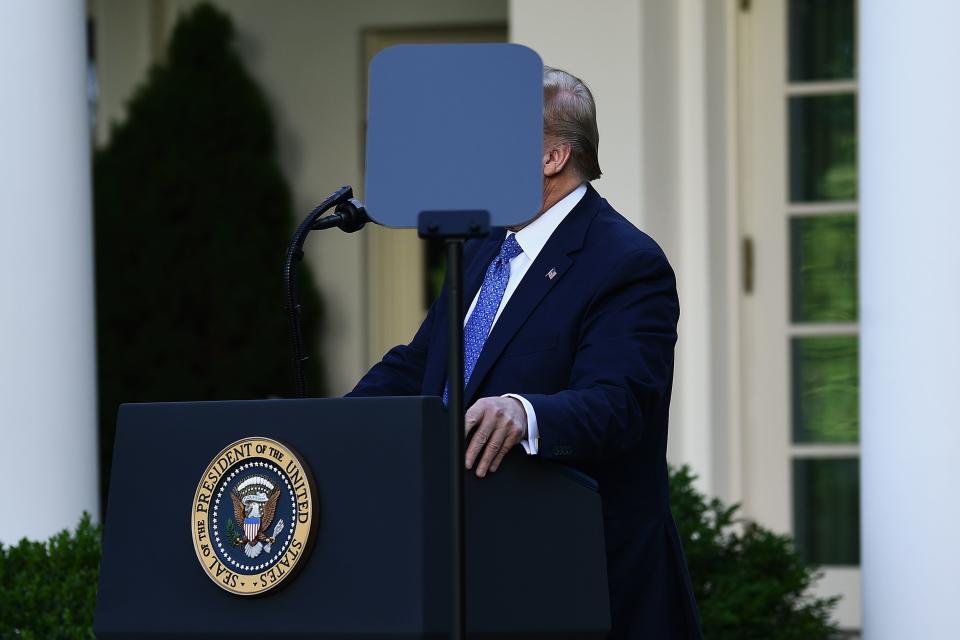The Trojan Horse in Trump’s anti-Twitter executive order
Think outside the censorship box.
Approximately 100 years ago (May 28, 2020) the White House put social media websites in its (very crowded) crosshairs. This was in the form of an executive order to regulate what Mr. Trump believes to be online censorship, specifically calling Twitter out by name. The order cited a list of Mr. Trump's personal grievances, set off by events a few days prior when Twitter attached a fact check link to a couple of his tweets.
The "Executive Order on Preventing Online Censorship" took effect June 1. The order’s gist centers on the White House belief (or rather, tactic) that fact-checking the White House or its allies constitutes anti-conservative bias. Since the order pretty much violates the First Amendment nine ways 'till Sunday, lawsuits against the order were ready to go; the Center for Democracy & Technology filed its suit June 2.
"The Order would circumvent the role of Congress and of the courts in enacting and interpreting [Section 230] ...and purport to empower multiple government agencies to pass judgment on companies’ content moderation practices," its lawsuit states. "The Order clouds the legal landscape in which the hosts of third-party content operate and puts them all on notice that content moderation decisions with which the government disagrees could produce penalties and retributive actions, including stripping them of Section 230’s protections."
So yeah, here we go with Section 230 (again). If you're unfamiliar, Section 230 is what came out of the Internet Freedom and Family Empowerment Act, an amendment to update the Communications Act of 1934 for the internet era. Or rather, Ye Olde Internet Era, as 230 hails from 1996. It has a strange and storied history that’s deeply entangled with a certain set of puritanical family values, entrenched in forcing broadcast art and communications to adhere to a specific worldview. It was known as The Communications Decency Act of 1996, which had hoped to censor porn on the internet but instead ended up protecting free speech online. Because it turns out that sexual expression is protected speech. Let’s hope someone tells Facebook and Tumblr.
Anyway. Section 230 basically makes it so that platforms like Twitter and Facebook can have user-generated content (what we say on their platforms) without the companies getting hosed by a range of laws that would make them legally responsible for what we say and do. So if we say something stupid, and someone wants to sue, that's on us. Section 230 is such a surprisingly robust, pro-free speech thing that it is pretty much universally regarded as a core protection of free speech on the internet.

The "Executive Order on Preventing Online Censorship" is quite a twisty bit of doublespeak in that regard. Yet what it does -- or vaguely intends to do -- is pretty chilling.
The order wants the FCC -- currently run by the guy who killed net neutrality, Ajit Pai -- to come up with regulations that stop section 230's protections for internet platforms' liability for what's posted there. "In addition," explained Forbes, "the order also directs the FTC to consider taking action in cases of complaints received by the White House of political bias on social media, and then to take action for deceptive acts or practices in such cases. The order also asks the FTC to consider complaints against Twitter as violations of the law."
Further, there are directives for the Attorney General to seek regulation and enforcement against online platforms at the state level and with federal legislation.
The order is being described, dismissively, as being so vague as to be ridiculous. “Trump's executive order on social media is a silly distraction from a serious debate,” said Sarah Miller, Executive Director of the Economic Liberties Project. “This executive order is basically a request to independent agencies, the Federal Communications Commission and the Federal Trade Commission, to act in some vague manner. The President cannot single-handedly change a law, he cannot order independent agencies to act, and his executive order reflects that.”
Miller is someone I usually agree with, but definitely not on this. I think this minimizing stance, and articles saying "Forget Trump’s Executive Order" ("Trump’s executive order may not do much") are pushing some dangerous thinking. Or, they are perspectives coming from people who were in no way affected by FOSTA-SESTA.
Because one horrible thing we learned about freedom of speech and internet companies is that it doesn't matter if the marching orders coming from lawmakers and the White House look like they won’t do much. FOSTA was vague and sought to neuter Section 230, too. What matters is how companies like Facebook et al decide to change their policies and guess how to implement whatever will make them safe from legal consequences.
FOSTA, as you may recall, was implemented as overbroad, compulsory censorship, ultimately encouraging discriminatory practices against sex workers (or anyone perceived to be a sex worker) everywhere. Some companies, like Facebook who lobbied for FOSTA, acted on the order before its ink dried, as it was (apparently) eagerly seeking a way to punish and exclude users whose sexual morality and professions as performers were not in line with its puritanical values.
Sexual speech is protected speech, and yet companies like Facebook and Tumblr leveraged the similarly vague FOSTA to aggressively censor users who even just talked about sex. It gave bad actors like Facebook the juice to use its "Sexual Solicitation" policy to ban "sexual slang," "sex chat or conversations," "mentioning sexual roles, sexual preference, commonly sexualized areas of the body" and more.

I like to imagine where we might be if these companies had treated hate groups, Holocauset deniers, and violent extremists with the same zeal for censorship and eradication from platforms, had given them no place to organize and recruit, or to plan and network. I imagine this because it makes me very mad, and it shows me very clearly why these vague White House directives affecting online speech are harmful to both the internet and democratic society.
FOSTA forced countless communities out of places where they once could participate with society, and it stifled speech in ways we have yet to fully comprehend. Tumblr's censorship of gender expression communities and the resultant exodus is just one terrible example. People died in FOSTA’s wake because of the ways it was interpreted and implemented.
To characterize the "Executive Order on Preventing Online Censorship" as just another of the Mad King’s follies is to ignore the disastrous previous lessons at our own peril. We must accept that everyone is going to be a bad actor and act accordingly. Companies like Facebook and toadies like Ajait Pai are proven bad actors. FOSTA, the last vague order to target Section 230, traded sex for Nazis. FOSTA killed the internet we loved. We must never ever forget that most internet companies and startups embraced it.
This is especially true in a moment of extreme change, and doubly so in one where the fire of accountability lights our path to survival.

